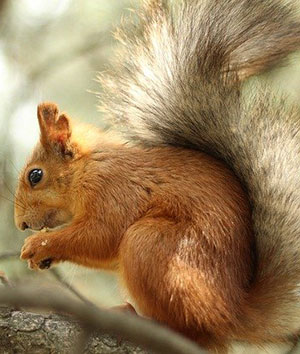 Most of us enjoy watching wildlife on and around our property. It gives us a sense of connection to nature. And that’s great.
Most of us enjoy watching wildlife on and around our property. It gives us a sense of connection to nature. And that’s great.
But trouble arises when we decide to ‘lure’ wildlife to our backyard with food. The reasons for not doing so are plenty; here’s what the Ministry of Natural Resources website says:
Threats to wildlife
- animals can become dependent on artificial food sources
- animals can lose their natural fear of humans and pets, becoming more prone to conflict
- artificial feed is not healthy for wildlife
- wild animals may gather in large numbers when they are being fed — this concentration of animals in one area can spread parasites and disease and cause destruction of natural habitat
- feeding animals near roads increases their risk of being hit by vehicles
Threats to people
- feeding wildlife may attract "unwanted" animals to your property
- animals will learn to associate humans with food, and can become a problem to neighbours
- habituated animals can become aggressive
- feeding animals near roads increases the risk of motor vehicle accidents, resulting in property damage, injury or death
Of course, inviting wildlife such as raccoons or squirrels to your surroundings may also result in considerable property damage. If access to a cozy attic isn’t readily available, our furry friends have little trouble creating such access and leaving you with roof, fascia, and/or siding repairs - and the expertise of a Wildlife Control Specialist such as Hawkeye to evict your house guests. And, by inviting a smaller critter, you may inadvertently also attract a larger critter... something a little higher up in the food chain. Probably not a wise idea, especially if you have small pets. Or kids.
But aside from all that – did you know that many municipalities have actual bylaws prohibiting feeding wildlife? They do. In most of Ontario, feeding wildlife is illegal. A couple in Vaughan recently found themselves the recipients of a $615 fine for feeding a solitary squirrel in their backyard. Neighbours did not approve and reported the animal control bylaw infraction to the city of Vaughan.
The City of Toronto has no set fine listed for this type of infraction but residents in Mississauga can face a maximum penalty of $5,000 for intentionally feeding wild mammals. In Hamilton, fines for the same thing start at $10,000 and range up to $25,000 upon subsequent convictions. Yikes.
The take-away here is to NOT feed wildlife around your home. Neither on purpose nor unintentionally. Secure your garbage, your shed, or your garage. Eliminate food and water sources. We have a list of tips for keeping wildlife out of your home and garden and are here to help remove raccoons, squirrels, skunks, and other wildlife if they have settled in on your property.














